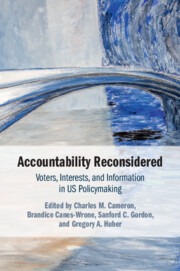Book contents
- Frontmatter
- Dedication
- Contents
- Figures
- Tables
- Contributors
- Acknowledgments
- 1 Introduction
- Part I Candidate Evaluation and Selection
- 2 The Importance of Issue Representation in a Polarized Congress
- 3 Can Citizens Assess Policies Based on Programs’ Costs and Benefits? The Role of Yardsticks and Contextual Information in Democratic Accountability
- 4 Logic with Polarized Parties, Changing Media, and Motivated Reasoners
- 5 Groups, Parties, and Policy Demands in House Nominations
- Part II The Media and The Informational Environment
- Part III Policymaking, Information Provision, and Accountability
- Part IV Outside The Public Eye? Private Interests and Policymaking
- Bibliography
- Author Index
- Subject Index
3 - Can Citizens Assess Policies Based on Programs’ Costs and Benefits? The Role of Yardsticks and Contextual Information in Democratic Accountability
from Part I - Candidate Evaluation and Selection
Published online by Cambridge University Press: 09 February 2023
- Frontmatter
- Dedication
- Contents
- Figures
- Tables
- Contributors
- Acknowledgments
- 1 Introduction
- Part I Candidate Evaluation and Selection
- 2 The Importance of Issue Representation in a Polarized Congress
- 3 Can Citizens Assess Policies Based on Programs’ Costs and Benefits? The Role of Yardsticks and Contextual Information in Democratic Accountability
- 4 Logic with Polarized Parties, Changing Media, and Motivated Reasoners
- 5 Groups, Parties, and Policy Demands in House Nominations
- Part II The Media and The Informational Environment
- Part III Policymaking, Information Provision, and Accountability
- Part IV Outside The Public Eye? Private Interests and Policymaking
- Bibliography
- Author Index
- Subject Index
Summary
In Chapter 3, Eric M. Patashnik, Patrick Tucker, and Alan S. Gerber employ evidence from two original survey experiments to explore voter responses to representatives’ actions. In the first set of experiments, voters learn that their representative has claimed credit for bringing the district a grant. But how do voters evaluate the lawmaker’s performance? Do they rely on the absolute size of the grant, or on its size relative to other grants when allocating rewards and punishment to a representative? The authors find that individuals are responsive to information about the relative, but not absolute, size of grants, and are more inclined to punish legislators for delivering below-average grants than reward them for securing above-average ones. The second set of experiments manipulates information about different kinds of benefits, and shows respondents react more strongly to information about specific policies than abstract ones. Together, the results indicate that citizens’ ability to hold representatives accountable depends on citizens’ ability to put policy actions into a concrete context they find meaningful.
- Type
- Chapter
- Information
- Accountability ReconsideredVoters, Interests, and Information in US Policymaking, pp. 42 - 67Publisher: Cambridge University PressPrint publication year: 2023



